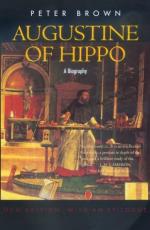|
This section contains 210 words (approx. 1 page at 400 words per page) |

|
"The Later Roman Empire was a military autocracy," (p. 66).
"Not only did Augustine live in an age of rapid and dramatic change; he himself was constantly changing," (p. 9).
"Augustine will never be alone. When he returned to Thagaste he formed a core of abiding friendships," (p. 61).
"He might appear to worship the Sun, like a pagan,...A Pagan, however, would have felt himself far below the Sun," (p. 56).
"In...384[CE]...the certainty of his youth had dissolved," (p. 79).
"In such a mood, he turned, yet again, to Cicero," (p. 79).
"These differences...were only symptoms of an even more profound tension over an issue that coincided only partially with the confessional division between pagans and Christians," (p. 102).
"He was told how a doorkeeper of the Basilica was healed by the body of S. Gervasius," (p. 125).
"A sense of intractable obstacles to perfection will lead Augustine to a new humility...
|
This section contains 210 words (approx. 1 page at 400 words per page) |

|




